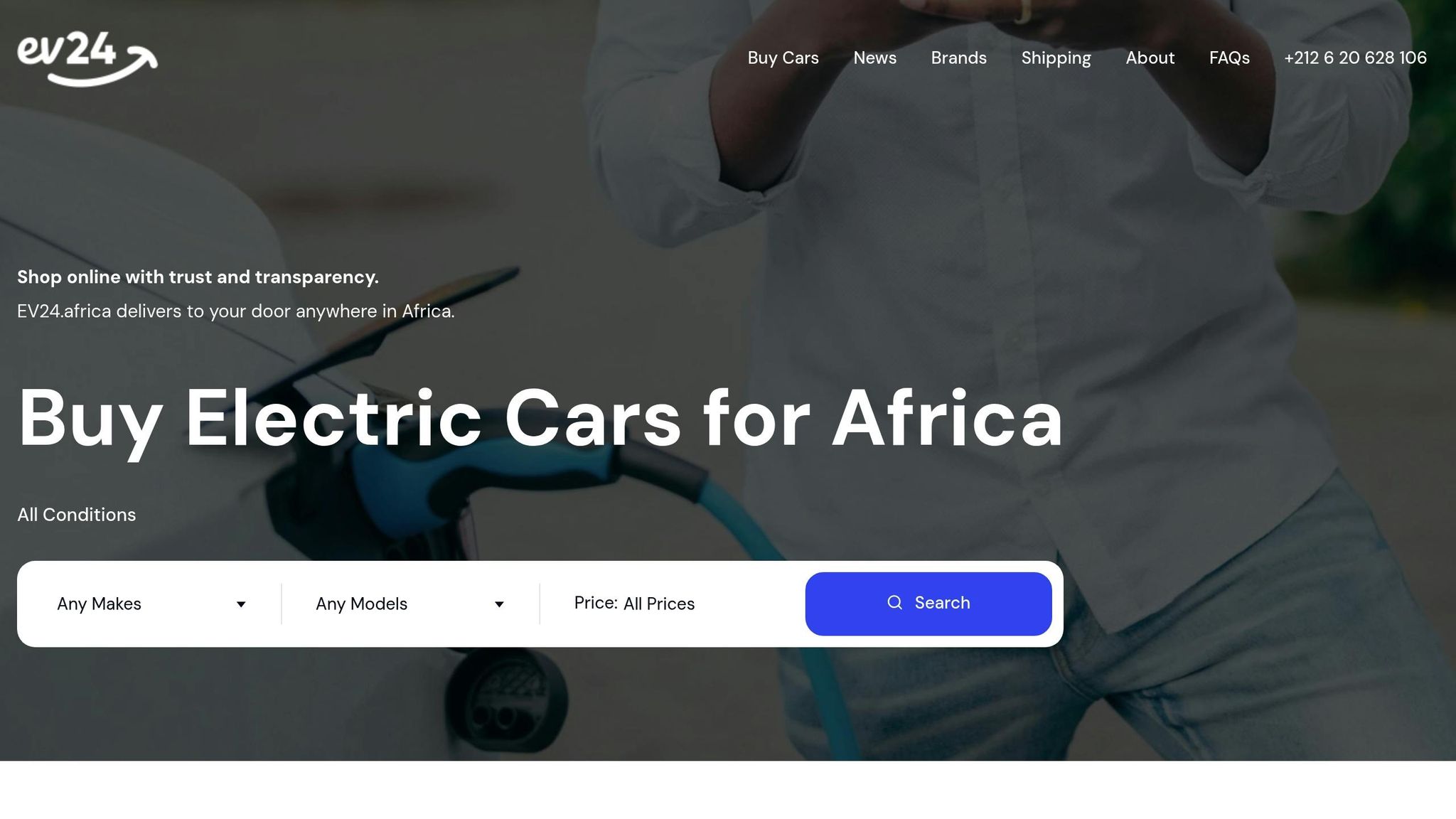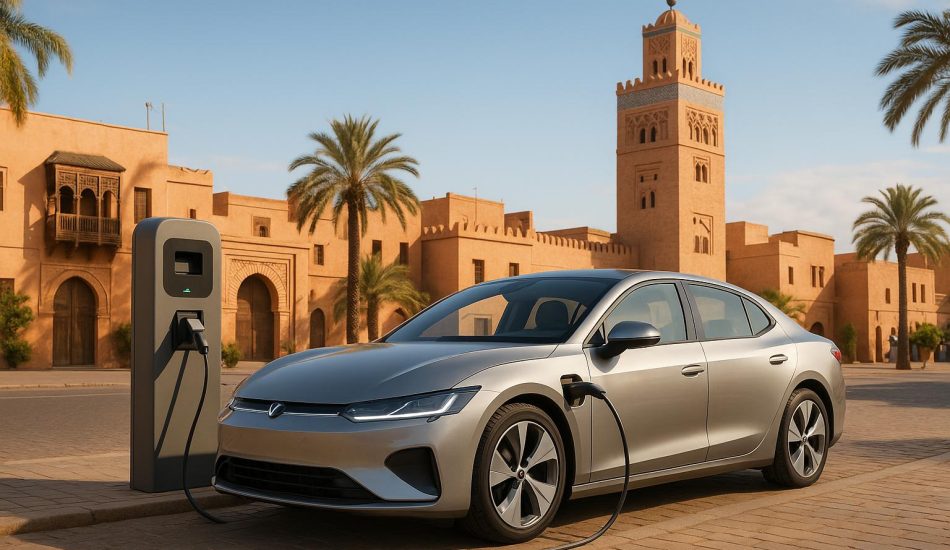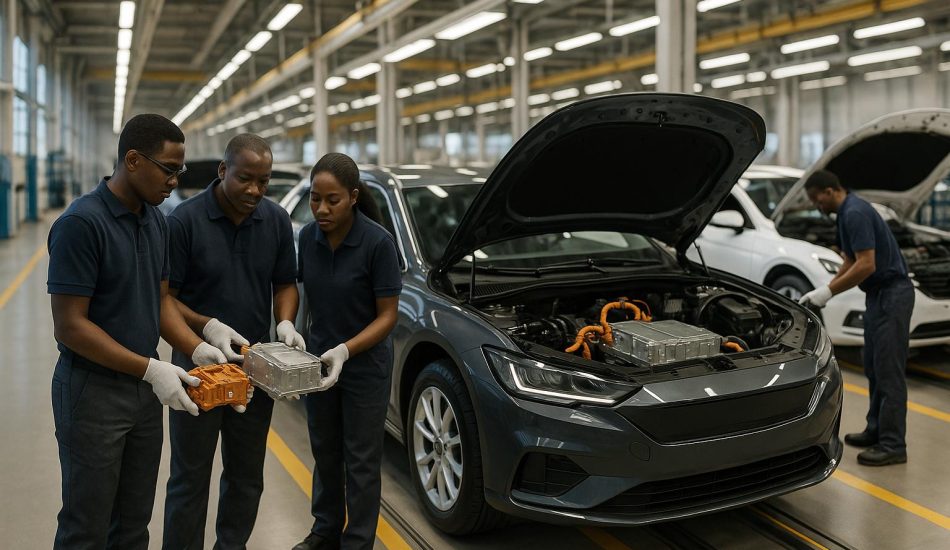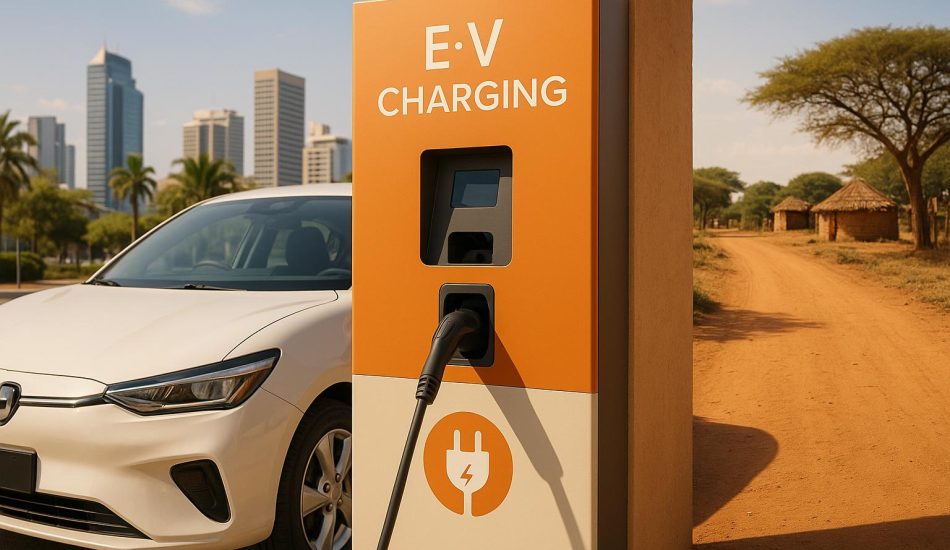
Africa’s electric vehicle (EV) market is growing, with sales expected to increase significantly by 2035. While challenges like limited charging infrastructure and financing options exist, opportunities are emerging in urban areas and through renewable energy integration. Key highlights include:
- Market Growth: EV sales are projected to rise from $17.41 billion in 2025 to $28.30 billion by 2030, driven by affordability and global advancements in EV technology.
- Focus Areas: Two- and three-wheelers are leading adoption due to lower costs and reduced infrastructure needs.
- Leading Countries: South Africa, Nigeria, Kenya, and Morocco are at the forefront, with efforts in East and West Africa showing promise.
- Barriers: Challenges include unstable power grids, lack of trained technicians, and reliance on imports.
For businesses, opportunities lie in affordable EV models, local battery production, and innovative financing solutions. Digital platforms like EV24.africa are also expanding access with flexible payment options and services like battery subscriptions. Africa’s EV market has the potential to reshape transportation, provided infrastructure and financing gaps are addressed effectively.
SA’s fully electric fleet to reach 22 500 cars by 2030 – report
EV Sales Projections for Africa Through 2035
The electric vehicle (EV) market in Africa is projected to grow considerably over the next decade, even though its current market share remains small. As the automotive sector expands, EVs are expected to carve out a larger share, fueled by a global movement toward cleaner, more sustainable transportation options. Below, we’ll explore the country-specific forecasts and global factors shaping this anticipated growth.
Initial adoption is likely to focus on two- and three-wheelers, which are more affordable and less dependent on extensive infrastructure. In urban areas, passenger cars are expected to gain popularity as charging networks and related services gradually become more accessible.
Country and Regional Sales Forecasts
South Africa is positioned to lead Africa’s transition to electric mobility, thanks to its established electrical grid and strong automotive manufacturing base. Nigeria is also expected to emerge as a key market, driven by rising demand for both commercial and personal transportation in its bustling cities. Meanwhile, countries like Kenya and Morocco are showing strong potential, supported by increasing renewable energy initiatives and shifting consumer preferences.
In East Africa, collaborative efforts among nations such as Rwanda, Uganda, and Tanzania are set to accelerate EV adoption, particularly in commercial fleets. Over in West Africa, markets like Ghana, Senegal, and Ivory Coast are anticipated to see growth in urban centers as charging infrastructure develops. However, regional adoption outside major cities may progress more slowly.
These regional dynamics provide a foundation for understanding the global factors influencing Africa’s EV market.
Global Market Effects on Africa
Global advancements, such as falling battery costs and improved charging technologies, are making EVs more affordable and accessible in emerging markets. The worldwide push for sustainable transportation has also led to new financing models and international investments aimed at building EV infrastructure across Africa.
Additionally, the transfer of technology and diversification of supply chains are expected to bolster local production. With both international and domestic stakeholders investing in EV manufacturing and charging networks, Africa stands to gain economically from this shift.
The electric vehicle market in Africa is on track for rapid growth, presenting valuable opportunities for manufacturers, investors, and policymakers committed to advancing sustainable mobility on the continent.
Factors Driving and Limiting EV Growth
Africa’s electric vehicle (EV) market presents a mix of opportunities and challenges as it evolves through 2035. By examining the forces at play, we can better understand why progress varies across regions and identify where targeted strategies might make the biggest impact. Below, we explore both the factors driving EV growth and the barriers slowing it down.
What’s Pushing EV Growth Forward
Government policies are playing a key role in accelerating EV adoption across the continent. Many African countries have introduced initiatives like tax breaks and reduced import duties to make electric vehicles more affordable. These measures aim to lower cost barriers, encouraging broader market participation.
Africa’s wealth of critical minerals is another advantage. The continent holds significant reserves of materials like cobalt, which are essential for battery production. This resource base positions Africa as an important player in the global EV supply chain, potentially attracting international investment and fostering local battery manufacturing in the future.
Urban air pollution in cities such as Lagos, Cairo, and Johannesburg is also driving the shift toward low-emission vehicles. These urban areas are grappling with the environmental and health issues caused by traditional combustion engines, making EVs an attractive alternative.
Africa’s advanced mobile payment systems could further support EV adoption. These systems offer opportunities for innovative approaches to managing charging payments, simplifying the process for consumers. Additionally, commercial fleet operators – ranging from ride-sharing companies to public transit providers – are exploring EVs as a way to cut long-term operating costs.
Infrastructure and Supply Chain Barriers
Despite these promising drivers, several challenges could hinder the widespread adoption of EVs.
One of the most significant obstacles is the lack of charging infrastructure. Public charging stations are scarce in many regions, often concentrated in major cities while rural areas are left underserved. This uneven distribution limits the practicality of EVs for many potential users.
Power grid reliability is another pressing issue. In countries with unstable grids, the dependence on electricity for EVs becomes a risky proposition. Nations like South Africa and Morocco, which have more reliable power systems, are better positioned to support EV expansion.
Africa’s reliance on imports also complicates the picture. Importing vehicles exposes the market to risks like currency fluctuations, shipping delays, and trade uncertainties. The limited local manufacturing base not only keeps EV prices high but also prevents the economic benefits of domestic production from being fully realized.
Financial barriers further slow adoption. Traditional lenders have been slow to adapt to the unique cost structures of EVs, leaving limited financing options for potential buyers.
Lastly, the shortage of technical expertise poses a challenge. With few trained technicians specializing in EV maintenance and repair, consumers may face higher service costs and longer wait times for repairs. This lack of support infrastructure could deter potential buyers from making the switch to electric vehicles.
These challenges create an uneven landscape for EV growth across Africa. The future of the market will depend on how well governments, businesses, and international partners address these issues while leveraging the opportunities that support cleaner and more sustainable transportation solutions.
sbb-itb-99e19e3
Business Opportunities for Market Players
With challenges like infrastructure gaps still present, businesses need creative strategies to tap into Africa’s growing electric vehicle (EV) market, which is expected to grow from $17.41 billion in 2025 to $28.30 billion by 2030.
Vehicle Manufacturers
As the market expands, manufacturers are turning their attention to cost-efficient vehicle models. The focus on electric two-wheelers and three-wheelers is particularly promising, offering quicker returns on investment. These vehicles align well with the financial realities and charging infrastructure available to African consumers.
A notable example is Transsion, Africa’s leading smartphone brand, which entered the EV market in 2023 with its TankVolt e-bikes in Uganda. By mid-2025, Transsion had expanded its operations to Nigeria, Kenya, Tanzania, and Ethiopia. TankVolt e-bikes are priced at $1,500, making them competitive with Ethiopia’s Dodai e-bikes at $1,800, along with similarly priced models from Spiro and Roam.
Investment Opportunities
Africa’s rich reserves of critical minerals like cobalt make it a prime location for battery manufacturing facilities. Establishing local production can meet domestic demand, reduce reliance on imports, and open up export opportunities for investors.
Another area ripe for growth is vehicle financing. Traditional lenders have been slow to adapt to the unique cost structures of EVs, leaving room for innovative financing solutions. Financial institutions and investment firms can step in to address these gaps with tailored programs that make EVs more accessible to consumers.
Online Platforms like EV24.africa

Digital platforms are becoming key players in driving EV adoption across Africa. Platforms such as EV24.africa offer competitive pricing and flexible payment options, making EVs more attainable. By partnering with financial institutions, these platforms can introduce digital lending and lease-to-own models, broadening access to electric vehicles for a larger audience.
In addition to vehicle sales, these platforms can diversify into services like battery-as-a-service and asset management tools for EV fleet operators. Concentrating on high-demand segments, such as electric two-wheelers and three-wheelers, allows them to generate quicker returns while targeting a broader market base. EV24.africa’s presence across all 54 African countries positions it to take full advantage of this emerging trend.
Building strong networks with resellers, financiers, and fleet operators will be essential for scaling operations and earning consumer trust.
Africa’s EV Market Outlook Beyond 2035
While detailed forecasts beyond 2035 are scarce, existing trends hint at Africa’s growing influence in the global electric vehicle (EV) market. The continent’s wealth of mineral resources – key for EV batteries – could significantly impact future supply chains and manufacturing strategies. This opens up opportunities for increased local production and the development of cutting-edge digital solutions tailored to the region.
Looking ahead, local production efforts might focus on segments that require less extensive infrastructure, making EVs more accessible to a broader audience. At the same time, digital platforms and fintech innovations could simplify distribution and build a more connected EV ecosystem, ensuring smoother operations and user-friendly experiences.
The future success of Africa’s EV market will hinge on a deep understanding of local needs, fostering collaboration across regions, and crafting business models that align with the continent’s diverse conditions. Overcoming historical challenges – like gaps in charging infrastructure – through strategic partnerships could pave the way for a more cohesive and sustainable mobility network across Africa. By addressing these areas, the continent has the potential to become a key player in the evolving EV landscape.
FAQs
What are the main challenges and opportunities for electric vehicle adoption in Africa by 2035?
Africa’s Challenges and Opportunities in EV Adoption
Adopting electric vehicles (EVs) in Africa by 2035 comes with its fair share of challenges. Some of the biggest hurdles include limited charging infrastructure, an unreliable electricity supply, high upfront costs, and weak policy support. These obstacles make it difficult to achieve widespread EV adoption across the continent.
That said, the potential for growth is undeniable. The market is expanding rapidly, with governments introducing incentives and rising investments in local EV production and charging infrastructure. If these infrastructure gaps and policy issues are tackled effectively, Africa’s EV market could see remarkable growth. By 2029, the market is expected to hit a value of $25.4 billion, growing at an annual rate of about 10%. This positions Africa as a key player in the future of electric mobility.
How are countries like South Africa, Nigeria, and Kenya driving the growth of the EV market in Africa?
South Africa is at the forefront of Africa’s electric vehicle (EV) movement, thanks to its strong automotive industry, advanced manufacturing capabilities, and government policies designed to boost EV adoption. Kenya is also making strides, aiming for EVs to make up 5% of its market by 2025. This push is supported by government incentives and steady progress in building charging infrastructure. Over in Nigeria, the combination of a large population and a growing automotive industry makes it a market with significant potential. While challenges like infrastructure gaps and policy execution remain, increasing investments are driving progress. These nations are shaping the future of EVs in Africa by blending strategic policymaking, infrastructure growth, and market development.
How do digital platforms and innovative financing make EVs more accessible in Africa?
Digital platforms like EV24.africa are transforming the accessibility of electric vehicles (EVs) across Africa. By providing consumers with vital resources – such as detailed vehicle information, sales channels, and access to charging infrastructure – these platforms make the transition to EVs smoother. They also serve as a critical link between government initiatives and everyday users, ensuring policies translate into practical benefits.
On the financial side, innovative solutions are breaking down barriers to EV ownership. Options like asset-backed leasing, digital lending, and embedded fintech models are making EVs more affordable and attainable. These flexible payment systems enable individuals and businesses to invest in EVs, accelerating adoption and promoting cleaner, more sustainable transportation across the continent.




